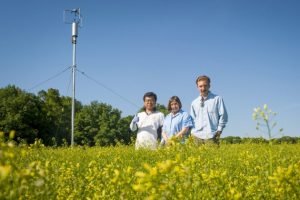Researchers at the UConn Plant Science Farm are studying the ecology of camelina as a high-tech crop. The research team is led by professor emerita Carol Auer and she and her team have been working with Camelina sativa, an oilseed crop that has never been grown commercially in the state. The feedstock has been subject to genetic modification for use to make biofuels, dietary supplements and bioplastics and could soon be a viable cash crops for farmers.

From left, postdoctoral fellow Chuan-Jie Zhang, professor emerita Carol Auer, and graduate student Richard Rizzitello in a field of Camelina sativa at UConn’s Plant Science Research Farm. (Sean Flynn/UConn Photo)
Camelina has historically been considered a weed and is closely related to other common weeds in the mustard family. According to Auer, this raises questions about future interactions between cultivated plants and their surrounding environment. With this in mind, one of the team’s main goals is to understand gene flow, the movement of genes between individual plants within a species or between closely related plant species. Gene flow between plants depends upon the movement of pollen by wind or insects, and the fields at UConn have demonstrated that camelina attracts pollinators such as honey bees, native bumble bees, and flies.
Graduate student Richard Rizzitello has been studying these insect visitors. “If camelina is planted across the U.S., it could provide good food resources for bees and other pollinators that are in decline,” he said. “But we need to know if the new traits from genetic engineering could cause problems in the environment. For example, we don’t want camelina to change from a cultivated plant to an aggressive weed.”
Over the next few years, the UConn research team will share their information about camelina gene flow and weed dynamics with farmers and other groups including government regulators who are responsible for crop biotechnology regulation.
“These experiences have given me a lot of insight into the challenges that regulators face. That’s a big driver for me in these projects,” said Auer. “Although it sounds simple, good baseline data about crop biology and ecology are essential to many regulatory decisions. In the long run, this research will help us manage biotechnology and improve coexistence in our farming systems.”
The research is supported by a grant from the Biotechnology Risk Assessment Grant Program, an initiative of the USDA’s National Institute of Food and Agriculture.

